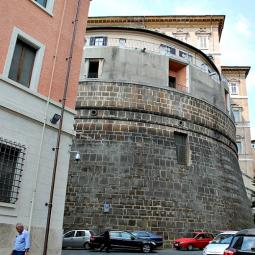|
Vatican Audit Suspended, Secretariat of State Announces
By Edward Pentin
VATICAN CITY — Just over four months since the Vatican announced that the Vatican would be subjected to an external audit by one of the world’s leading accounting firms, the Secretariat of State has said that it is pulling the plug on the initiative. The Vatican announced the decision to suspend the audit, carried out by accountancy giant PricewaterhouseCoopers, in a letter sent to all Vatican entities this week. On Dec. 5, the Vatican revealed that Pope Francis’ had brought in the auditing firm on the advice of the Vatican Secretariat for the Economy in a bid to reform Holy See finances and make them more transparent after a number of scandals. The audit began immediately after the announcement. News of the audit’s suspension comes as an article appeared in today’s Italia Oggi newspaper alleging that a possible replacement for Jean Baptiste De Franssu, the current president of the Institute for the Works of Religion (IOR), colloquially known as the Vatican Bank, had turned down an offer. According to the article, penned by Antonino D’Anna, the proposed candidate said he “felt awkward” accepting the position — not because of financial reasons but because it was a “complex situation.” The newspaper went on to claim the refusal indicates the “era” of Cardinal George Pell, prefect of the Vatican Secretariat for the Economy, was “over, or nearly so.” It goes on to also speak of the need of an Italian replacement for De Franssu, who is French. His predecessor Ernst von Freyberg was German, and both have led reforms of the Vatican Bank in a bid to bring them into line with international anti-money laundering regulations. Reliably informed sources say De Franssu was not due to leave his position in June, and that the contents of the article, as well as the suspension of the audit, are ultimately aimed at unseating Cardinal Pell and replacing both him and De Franssu with Italian officials. “They’re afraid of the audit uncovering information they don’t want uncovered and are worried about losing sovereign control over Vatican finances,” said a source. “What they want is to get rid of Cardinal Pell, but it’s important to remember that a pope resigned largely because of these issues.” Another source with experience of Holy See finances said the move to suspend the audit is meant to “send a clear message that the Secretariat of State is again in control of the machine.” The Vatican’s Financial Management Until Francis created the Secretariat for the Economy, Vatican finances were loosely overseen by the Secretariat of State, which traditionally has served as the central administration for the Roman Curia and which currently is headed by Italian Cardinal Pietro Parolin; by the Administration of the Patrimony of the Apostolic See (APSA), which dealt with real estate, personnel and assets; and by the Prefecture for the Economic Affairs of the Holy See, which audited the balance sheets and budgets of curial offices. Each dicastery tended to manage its own budgets independently of one another. IOR was a further entity, separate from the Roman Curia. Most of these responsibilities were subsumed into the Secretariat for the Economy, which now has almost total authority over Vatican finances. APSA was halved in two and now acts as the Vatican’s central bank. Although the Holy See’s real estate responsibilities were initially given to the Secretariat, they were returned to APSA last year. In 2014, Pope Francis also established three bodies — including the Council for the Economy, which is comprised of 15 members and is charged with inspecting the budget forecasts and final budgets of all dicasteries, offices and organizations of the Holy See and Vatican City State — to monitor the work of the Secretariat and Vatican finances in general. Pope Francis appointed Cardinal Pell to head up the new Vatican Secretariat for the Economy in 2014. Although the Australian prelate turns 75 in June and is obligated to submit his resignation, he was given a five-year mandate and so expected to continue beyond this year. Until it hired PwC, the Vatican had always used an Italian external auditor but the decision to hire PwC marked the first time the Vatican had sought to raise its financial operations to international auditing standards. In 2014, Cardinal Pell said he had discovered millions of euros “tucked away” in Vatican dicasteries. He did not say any wrongdoing had occurred, but added that Vatican departments long had “an almost free hand” with their finances. The Vatican said in December that PwC would review the Vatican’s consolidated financial statements which include assets, income and expenses.
|
.
Any original material on these pages is copyright © BishopAccountability.org 2004. Reproduce freely with attribution.
